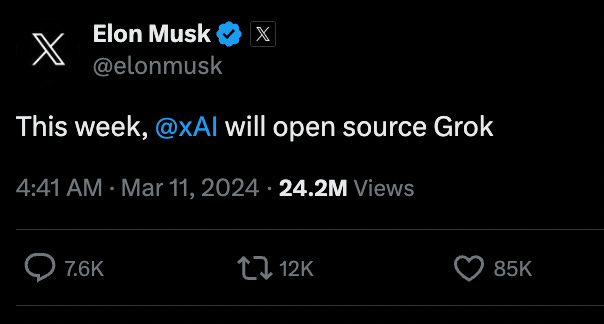Positioning. It happens in the market and inside board rooms. Elon Musk posted on X that Grok will become open-source. This was largely welcomed, even by Jeff Bezos, who referenced his own earlier X post lamenting that Grok was proprietary, much like that company Elon is currently suing for its switch away from openness.
Openness Positioning
The shift to open-source is good market positioning for Grok. The proprietary large language model (LLM) and generative AI chatbot segments are already crowded. Open-source options are plentiful, but the options for open frontier-quality models are limited. Grok’s original LLM benchmarks show it is on a path to providing a top-performing model in the same league as Meta.
Musk may truly believe in open-source for generative AI. He claims to have named OpenAI with that idea in mind. However, it is also a great positioning strategy. Every company is attempting to become the key alternative to OpenAI because it has the most mindshare and market share. Musk is raising Grok’s relevance by contrasting the two companies and their approaches.
Return of the King Positioning
Sam Altman has executed his own repositioning. The overwhelming success of ChatGPT, followed by the prowess of GPT-4, turned OpenAI’s CEO and board chairman into the face of generative AI.
However, the boardroom coup in November 2023 briefly removed Altman and OpenAI’s president, Greg Brockman, from the board and fired Altman from his CEO role. Brockman then quit, and the two of them engineered a return to the company. That return did not initially include a board seat. That has changed.
Altman has returned calm and steadiness to OpenAI, and most people have forgotten the tech insider soap opera that played out over the Thanksgiving Holiday week in the United States. Maybe some normal people didn’t even notice it happened.
OpenAI’s revised board from November 2023 included Bret Taylor, Larry Summers, and Adam D’Angelo. New additions include “Dr. Sue Desmond-Hellmann, former CEO of the Bill and Melinda Gates Foundation, Nicole Seligman, former EVP and General Counsel at Sony Corporation and Fidji Simo, CEO and Chair of Instacart.”
Clean Slate Positioning
Sam Altman’s return to OpenAI’s board followed an investigation of the events surrounding his termination in 2023. Lawyers from Wilmer Hale conducted the investigation and said they reviewed over 30,000 documents and conducted dozens of interviews. A summary of the conclusions was published in an OpenAI blog post.
WilmerHale reviewed the public post issued by the prior Board on November 17 and concluded that the statement accurately recounted the prior Board’s decision and rationales. WilmerHale found that the prior Board believed at the time that its actions would mitigate internal management challenges and did not anticipate that its actions would destabilize the Company. WilmerHale also found that the prior Board’s decision did not arise out of concerns regarding product safety or security, the pace of development, OpenAI’s finances, or its statements to investors, customers, or business partners. Instead, it was a consequence of a breakdown in the relationship and loss of trust between the prior Board and Mr. Altman. WilmerHale found the prior Board implemented its decision on an abridged timeframe, without advance notice to key stakeholders, and without a full inquiry or an opportunity for Mr. Altman to address the prior Board’s concerns. WilmerHale found that the prior Board acted within its broad discretion to terminate Mr. Altman, but also found that his conduct did not mandate removal.
According to the findings, members of an inexperienced corporate board were concerned about “internal management challenges” and decided to fire the CEO, who was a co-founder, well-liked by the staff, and the face of the company. This is a board that doesn’t understand positioning. The exception may be Adam D’Angelo. He was the sole initial holdover from the earlier board. Given that he was retained, it is likely he opposed Altman’s ouster.
The more salient point is whether the investigation's conclusions are believable. It is believable that the previous board “did not anticipate that its actions would destabilize the Company.” The fallout, ripple effect, and intense media interest may have been difficult to predict. However, overlooking that there might be scrutiny from the media, policymakers, partners, customers, and investors seems like an oversight that an experienced board should have anticipated.
Less believable is the statement that the “Board’s decision did not arise out of concerns regarding product safety or security, the pace of development, OpenAI’s finances, or its statements to investors, customers, or business partners.” Most of the discussions at the time and immediately in its aftermath spoke to AI safety issues and an overly fast pace of development for the project named Q*. This could have all been fabricated to feed the rumor mill, but it is likely that the board members wouldn’t fire Altman just because of management friction. Wilmer Hale found a difference of opinion, and the current board does not believe the concerns of the previous board were justified.
The new board, Altman and Brockman's exoneration, and the statement that nothing about business risk contributed to the turmoil should enable OpenAI to claim they are working from a clean slate. Whether or not the findings are precisely true, they are designed to provide assurance to investors and customers that the business is stable and there won’t be any need to worry about a similar risk in the future.
But…
The clean slate is not the entire story. You may know that Elon Musk has filed a lawsuit against OpenAI. According to Reuters:
Elon Musk has sued ChatGPT-maker OpenAI and its CEO, Sam Altman, saying they abandoned the startup's original mission to develop artificial intelligence for the benefit of humanity and not for profit…
Musk has sought a court ruling that would compel OpenAI to make its research and technology available to the public and prevent the startup from using its assets, including GPT-4, for financial gains of Microsoft or any individual.
OpenAI countered with legal arguments questioning the coherence of the lawsuit and a lengthy blog post by several company co-founders and senior management members. The company does not believe there is a breach of contract or any diversion from the original goal; it is just a shift in the method for achieving those objectives. They go on to suggest that Musk agreed with the shift and wanted to bring it inside of Tesla, a private company.
Is this just a case of Musk fighting back because management rebuffed its acquisition overtures? Musk is attempting to position OpenAI as greedy and dishonest and also ignoring the possibility that the company might cause harm by creating an AI superintelligence. OpenAI is attempting to position Musk as a disgruntled early investor who is jealous because he is no longer involved with the company.
Positioning
The positioning game is non-stop in generative AI. It permeates every announcement, the timing of those announcements, and the views the companies would like to plant in the market. Sam Altman and Elon Musk are just the most overt and calculating of the company founders. They both also have large media reach. The narratives have seeds of truth, but they also serve to obfuscate key facts as much as to promote a positive message.
10 LLM Security Vulnerabilities Explained
Generative AI introduces new security threats because it alters both the digital attack surface and the type of systems within it. The attack surface is expanded due to new endpoints in the form of large language models (LLM), new application interfaces, and a set of novel supporting technologies often associated with generative AI implementations.
Three of Four Businesses Have at Least One Generative AI Solution According to a New Study
A newly published study from MIT Technology Review found that 76% of businesses had conducted at least one trial with generative AI as of the end of 2023. Only 6% said they had no plans to use generative AI, while another 18% plan to use the technology but have not yet started. Nearly half are using the technology for specific use cases or are using it…









